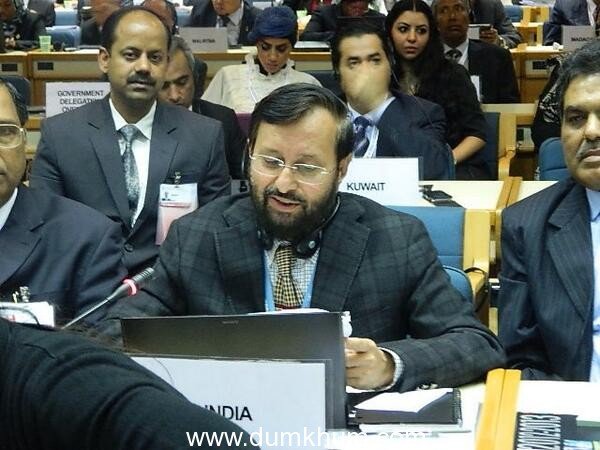INDIA IN THE UN ENVIRONMENTAL ASSEMBLY : NAIROBI, KENYA
Prakash Javadekar says sustainable development goals
must address concerns of developing nations ;
Union Minister for Environment, Forests and Climate Change, Mr. Prakash Javadekar has reiterated India’s stand on climate change and said that poverty eradication must be the over-riding aim of the sustainable development goals. During his address at the first Ministerial Plenary of the United Nations Environment Assembly in Nairobi, Kenya, and during his bilateral interactions with world leaders, Mr. Javadekar made it clear that efforts to make global economy sustainable must not be at the cost of the world’s poor.
The Minister said that India attaches utmost importance to the evolution of the post-2015 development agenda but it must address the three dimensions of sustainable development – economic, social and environmental – in a balanced manner. He said the Post-2015 Development Agenda should be universal in nature and not be a series of policy prescriptions from the North to the South .
Javadekar said, improving energy efficiency and resource use is important but the developed countries have to lead from the front and commit technology transfer to developing countries. The Minister also said that the proposed $ 100 billion Green Climate Fund should be utilised to purchase IPRs of most crucial technologies for public good and these technologies should then be freely available to developing countries.
The Minister also drew attention of the world leaders to the issue of sustainable consumption, and said that wastage of food at consumer level alone in industrialized countries is nearly equal to the total food production in Sub-Saharan Africa. He said it is imperative for the developed countries to take lead to shift towards sustainable consumption patterns.
Informing the UN environmental forum, Javadekar said India’s National Climate Action plan has eight missions— solar energy, energy efficiency, sustainable habitat, water, Himalayan eco-system, Greening India, sustainable agriculture and strategic knowledge for climate change. The new initiatives relate to integrated coastal development, forest conservation, combating desertification, island development and cleaning the river Ganga, he added.
During his three day visit to Nairobi, the Environmental Minister also held wide ranging bilateral discussions with Janez Potocnik, European Commissioner for Environment and Achim Steiner, Executive Director, UNEP in Nairobi. Javadekar also met with BRICS Environment Ministers for an informal dialogue hosted by China.
About UNEA
United Nations Environment Assembly is a result of the call made by world leaders at the United Nations Conference on Sustainable Development (Rio+20), held in Brazil in June 2012. It aims to strengthen and upgrade United Nations Environment Programme as the leading global environmental authority that sets the global environmental agenda. The first meeting at the UNEP Headquarters in Nairobi was attended by 1300 delegates including Ministers, government nominees, economists, civil society leaders etc. (Ends) |( PIB Mum|MD)










